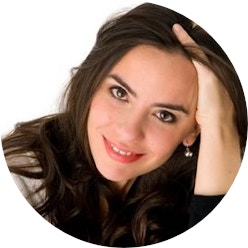
Mariana Rewerski
About
Mezzo-soprano Mariana Rewerski is a multifaceted and dynamic artist who brings to her performances the passion one would expect from the native of Buenos Aires, Argentina. A voice of lyric beauty and great versatility, she has portrayed many of the important roles from the standard repertoire, while also seeking out less often performed works ranging from the medieval and baroque to the new music of today's up-and-coming composers. At home in opera, chamber music, oratorio and song, she is establishing herself internationally as a rare talent.
While earning a diploma in piano from the National Conservatory in Buenos Aires, she won first prize in the Academia Bach Shell CAPSA Voice Competition in 2000. She was immediately accepted into Teatro Colón's prestigious Institute of Art. It was there that she was chosen to sing Cherubino at the Teatro Colón, where she would later return to sing Dorabella, Hermia (Britten's A Midsummer Night's Dream), and Charlotte. During this time, she joined companies such as Juventus Lyrica and Buenos Aires Lírica, debuting many important roles in the Teatro Avenida including Carmen, Dorabella, Isabella, Cherubino, Second Lady, The Neighbor in Stravinsky’s Mavra, roles in L’enfant et les sortilèges, and the title role in Offenbach's La belle Hélène.
Mariana was then invited to the International Opera Studio in Zurich where she sang Clarice in Rossini's La Pietra del Paragone as well as numerous smaller roles on the main stage of the Zurich Opera. Establishing her home in Europe, she rounded out her training with studies at the Scuola Musicale di Milano as well as IDEV in Paris and made debuts as Hermia in Britten’s A Midsummer Night’s Dream at the Opéra de Nice and Zerlina in Porrentruy (Switzerland) in a televised performance produced by the Fondation Axiane with Barockorchester Capriccio Basel.
As a passionate interpreter of baroque music, she was sung Ottavia in Monteverdi’s L’incoronazione di Poppea with William Christie and Les Arts Florissants, Dido in Purcell’s Dido and Aeneas, Euridice in Charpentier’s La descente d’Orphée aux enfers, Cavalieri's Rappresentatione d’Anima et di Corpo, Cavalli’s La virtú degli strali d’amore and Gli amori d'Apollo e di Dafne, Rameau’s Les Indes Galantes, and most recently, Argene in Vivaldi’s L’Olimpiade at the Castle of Schwetzingen (Heidelberg Opera House) and Handel's Rinaldo (title role) at the National Theatre in Czech Republic. She was also was profoundly influenced, both artistically and personally, by the great singer and musicologist Ann-Marie Deschamps. It was with her ensemble Venance Fortunat that Mariana was introduced to the performance practices of medieval chant and the interpretation of manuscripts such as the Gradual de Bellelay.
Additional theaters where Mariana has performed include the Teatro de la Zarzuela (Madrid), Teatro Politeama Garibaldi (Palermo, Italia), Teatro del Círculo (Rosario, Argentina), Teatro Arriaga (Bilbao) and festivals such as the Prague Spring Festival and Ostrava's St. Wenceslas Music Festival (Czèch Republic), Festival de Sully et Loiret, Festival de Vézelay, Festival de Pontoise, Festival de Sablé, Festival de la Chaise Dieu and Festival d'Ambronay (France), Festival de Wallonie, Festival de Flandres (Belgium) and in Latino America-Baroque Music Festival in Chiquitos, (Bolivia) and in the Oficina de Musica Antiga in Curitiba (Brasil).
In oratorio and concert, she made her debut in the Teatro Colón in the Bach Magnificat and Vivaldi Gloria. Other credits include Bach’s St. Matthew and St. John Passions, B Minor Mass, and the Christmas Oratorio, Mozart's Requiem, Beethoven's 9th Symphony, Duruflé's Requiem, and Vivaldi's Juditha Triumphans. Most recently she was heard as Cleophe in Haendel’s La Resurrezione and in Zelenka’s Officium Defunctorum and I Penitenti al Sepolchro del Redentore.
An avid recital singer, she has a repertoire spanning a broad range of styles and languages. Since 2001, she has enjoyed collaborating with pianist Valeria Briatico, frequently performing programs exploring the gamut of intimate songs from the 19th and 20th centuries.
Mariana can be heard on recording as Pippo in Rossini's La gazza ladra at the Wildbad Rossini Festival under the baton of Alberto Zedda (Naxos live recording), as la Sospecha and Terpsichore in Torrejón y Velazco’s La Purpura de la Rosa, as Venus in Cavalli’s Gli amori di Apollo e di Dafne with the Elyma Ensemble (Gabriel Garrido), as the Israelite Man in Handel's Judas Maccabaeus with the ensemble Les Agremens under Leonardo G. Alarcón, and in the role of Maddalena in I Penitenti al Sepolchro del Redentore by Zelenka with Collegium 1704 under Vaclav Luks.
Upcoming engagements include the title role in Handel’s Rinaldo at the Prague National Theatre, Grand Theatre de Luxembourg, Opéra de Caen and Opéra de Rennes, Haydn's Stabat Mater with the Orchestre de Chambre de Lausanne and the role of Martha in the world première performance and recording of Oscar Strasnoy's Un retour at the Aix-en Provence Festival.

